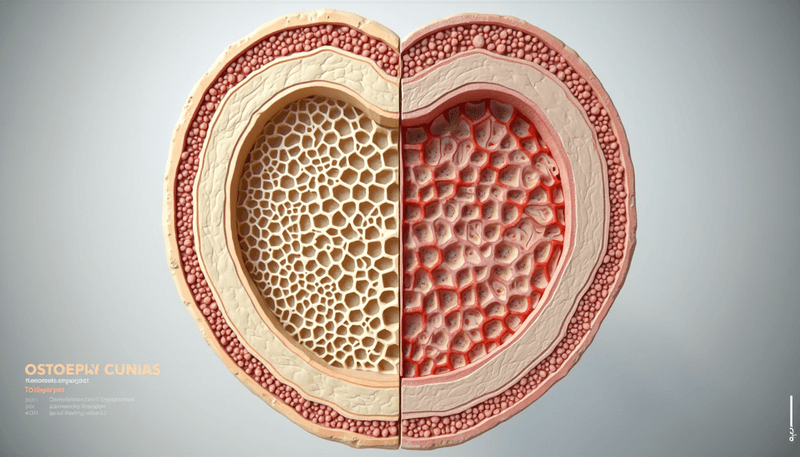Menopause and Bones: What Changes Inside

Have you ever wondered why your mother suddenly seemed to get shorter after menopause? Or why your doctor starts talking more about calcium supplements as you approach your 40s? The connection between menopause and bone health is more fascinating - and important - than most of us realize. New research reveals that women can lose up to 10% of their bone mass in just the first five years after menopause, making this a critical health topic for women of all ages to understand.
Understanding the Bone-Hormone Connection
Think of your bones as a living bank account where you can deposit and withdraw calcium. During your younger years, you're making more deposits than withdrawals, building up strong, dense bone tissue. However, around menopause, this balance shifts dramatically. The reason? Estrogen, that powerful hormone that does so much more than regulate our monthly cycles, also plays a crucial role as our bones' security guard.
Have you noticed any changes in your height or posture as you've gotten older?
When menopause begins, estrogen levels drop significantly. It's like losing the security system that kept your bone bank safe - suddenly, more calcium is being withdrawn than deposited. This process happens gradually, but its effects can be significant. Research shows that postmenopausal women can lose bone density at a rate of 1-5% per year.
The Silent Nature of Bone Loss
One of the most challenging aspects of bone loss is its sneaky nature. Unlike other menopausal symptoms like hot flashes or mood changes, you won't feel your bones becoming less dense. The first sign might be a fracture from a minor fall that shouldn't have caused such damage.
Osteoporosis, often called the "silent disease," develops gradually without symptoms until a bone breaks. Think of it like termites quietly weakening a wooden structure - you might not notice until something gives way.
When was the last time you had a bone density scan? If you're approaching menopause, it might be time to schedule one.
I remember a patient, Sarah, who came to me after breaking her wrist while catching herself during a minor slip. She was only 52 and had been focusing on managing her hot flashes, never considering that her bones might need attention too. Her story is common - many women don't realize they have weakened bones until something breaks.
Taking Action: Building Your Bone Bank
The good news is that we can take proactive steps to maintain bone health before, during, and after menopause. Here's what research shows works best:
1. Movement Matters
- Focus on weight-bearing exercises like walking, dancing, or low-impact aerobics
- Add resistance training with bands or light weights 2-3 times per week
- Include balance exercises to prevent falls
2. Nutrition for Strong Bones
- Aim for 1000-1200mg of calcium daily from food sources first
- Include vitamin D-rich foods or supplements (the recommended amount varies by age and location)
- Reduce caffeine and alcohol intake, which can interfere with calcium absorption
3. Lifestyle Adjustments
- Stop smoking if you currently do
- Limit alcohol to no more than one drink per day
- Get regular bone density screenings starting at menopause
One of my patients, Maria, adopted these changes in her early 40s. She started taking evening walks with her daughter and added yogurt to her daily breakfast routine. Five years later, her bone density tests showed she had maintained healthy bone mass despite being post-menopausal.
What small change could you make today to better protect your bone health?
The relationship between menopause and bone health is complex, but understanding it empowers us to take action. By making informed choices now, we can help maintain strong, healthy bones well into our later years.
Don't wait for a fracture to start thinking about bone health. Start today by adding one bone-healthy habit to your routine. Whether it's a daily walk, an extra serving of calcium-rich foods, or scheduling that overdue bone density screening, your future self will thank you.
Take the first step: Choose one bone-strengthening activity from this post and commit to it for the next month. Share your commitment with a friend or family member - accountability can make all the difference in creating lasting healthy habits.

Dr. Marcus Anthony Bennett
Dr. Marcus Bennett is a Seattle-based freelance medical writer and consultant specializing in mid-aged women's health. With a background in internal medicine and over a decade of experience in preventive care, he is dedicated to making complex health topics accessible. Dr. Bennett completed his MD at Johns Hopkins School of Medicine and residency at the University of Washington. His empathetic and evidence-based approach combines traditional medical expertise with a focus on health disparities, often incorporating practical lifestyle advice. Known for his clear, engaging communication, Dr. Bennett provides actionable insights to empower his audience.







